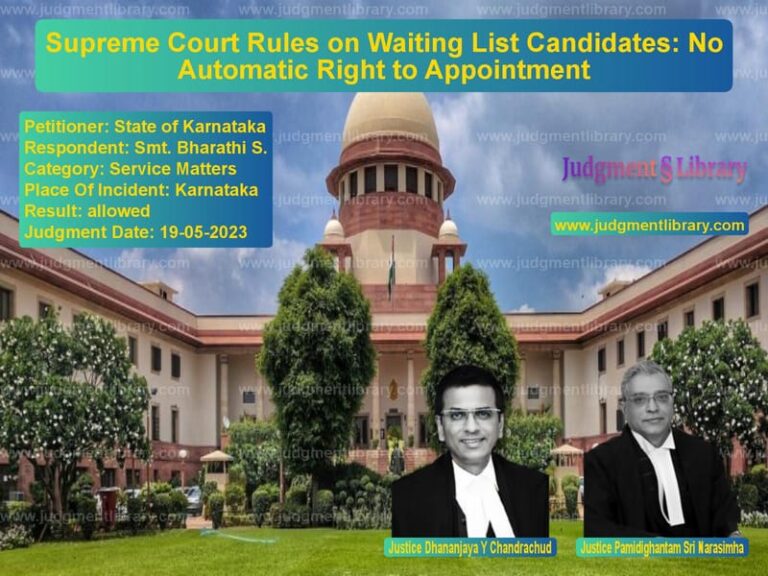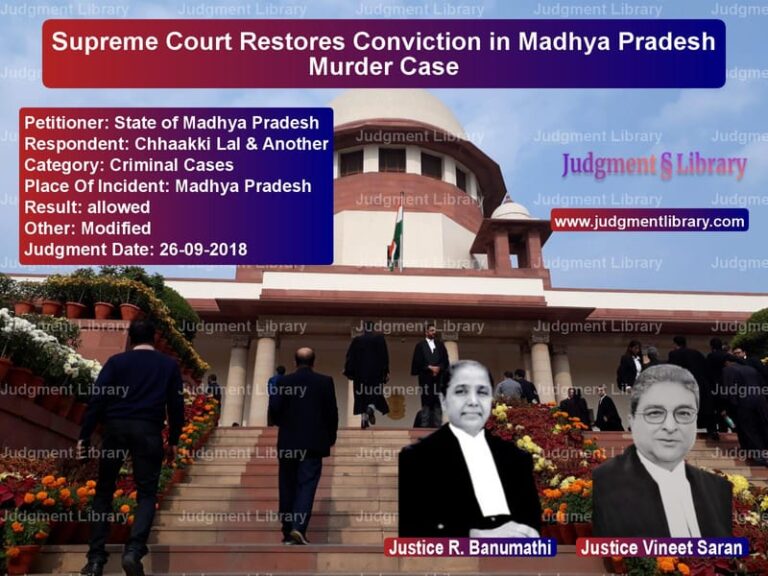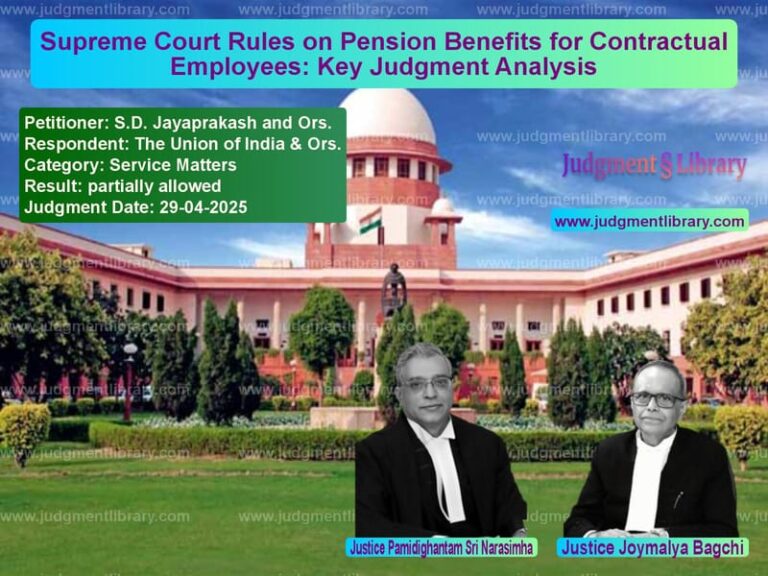Legal Analysis of the Supreme Court Judgment in Uma Shankar & Ors. vs. R. Hanumaiah & Ors.
The case of Uma Shankar & Ors. vs. R. Hanumaiah & Ors. before the Supreme Court of India is a landmark ruling addressing issues of land acquisition, government power, and the legal sanctity of judicial decisions. This case involved a complex dispute over land originally acquired by the government and later subject to multiple legal challenges seeking re-conveyance. The Supreme Court’s decision, delivered on May 12, 2017, emphasized the finality of government land acquisition and the limitations of administrative decisions in reversing judicially settled matters.
Introduction
Land acquisition has long been a contentious issue in India, with numerous disputes arising over compensation, re-acquisition, and de-notification of acquired land. This case was significant because it highlighted the government’s inability to arbitrarily return acquired land to previous owners once the legal acquisition process was completed. The matter also raised questions about the role of the executive in interfering with final judicial pronouncements.
Background of the Case
The dispute arose when land owned by R. Hanumaiah and others was acquired by the City Improvement Trust Board (CITB), later succeeded by the Bangalore Development Authority (BDA), under the provisions of the Land Acquisition Act, 1894. The acquisition process, initiated in 1959, was legally completed in 1975 with compensation paid to the landowners. However, despite this, multiple efforts were made over the years to reclaim the land through government intervention.
Key Legal Issues
The Supreme Court had to determine:
- Whether land legally acquired and vested in the government could be de-acquired years later.
- Whether the Karnataka government’s de-acquisition order was valid in light of the Supreme Court’s previous ruling.
- Whether the Bangalore Development Authority (BDA) was bound by executive orders from the state government.
Arguments Presented
Petitioner’s Arguments (Uma Shankar & Ors.)
The petitioners, who had been allotted land by the BDA, contended that:
- The Supreme Court had already ruled against re-conveyance of the land in a previous judgment in 2005.
- The Karnataka government’s attempt to reverse the acquisition via de-notification in 2009 was illegal.
- Allowing re-conveyance would set a dangerous precedent where settled acquisitions could be reopened arbitrarily.
Respondent’s Arguments (LRs of R. Hanumaiah)
The respondents argued that:
- The government had the authority under Section 65 of the Bangalore Development Authority Act to direct BDA to release land.
- The land had not been put to the intended public use, making its return justifiable.
- The government had reconsidered the case and had the right to correct previous decisions in favor of the original owners.
Supreme Court’s Ruling
The Supreme Court, comprising Justice Arun Mishra and Justice Navin Sinha, unequivocally held that once land was acquired, compensation paid, and possession taken, it could not be returned to the original owners under any circumstances. The Court observed:
“The acquisition process stood completed once possession was taken, and the compensation was paid. The subsequent government decisions attempting to re-convey the land were wholly illegal and in violation of this Court’s previous rulings.”
The Court struck down the Karnataka government’s 2009 de-notification order as illegal, null, and void, stating that executive directions could not override judicial pronouncements.
Key Legal Takeaways
- Finality of Land Acquisition: Once land is acquired and vested with the government, it cannot be returned to original owners.
- Judicial Precedent is Binding: Government orders attempting to reverse a Supreme Court ruling are legally unsustainable.
- Limits on Executive Power: The state government cannot arbitrarily interfere in settled land acquisitions.
Implications of the Judgment
This ruling has wide-ranging implications for land acquisition laws in India:
- Prevents Political Interference: The judgment curbs attempts by governments to misuse discretionary powers for political favors.
- Strengthens Investor Confidence: Developers and allottees can rely on legally acquired land without fear of future challenges.
- Reinforces Rule of Law: It ensures that judicial decisions are final and binding, preventing administrative overreach.
Conclusion
The Supreme Court’s decision in Uma Shankar & Ors. vs. R. Hanumaiah & Ors. is a landmark ruling upholding the sanctity of land acquisition laws. By rejecting the Karnataka government’s attempt to reverse a settled acquisition, the Court reaffirmed the principle that legal finality cannot be disturbed by executive actions. This judgment sets a crucial precedent for future cases involving land acquisition disputes, ensuring that judicial authority remains paramount in governance.
Don’t miss out on the full details! Download the complete judgment in PDF format below and gain valuable insights instantly!
Download Judgment: Uma Shankar & Ors. vs R. Hanumaiah & Ors. Supreme Court of India Judgment Dated 12-05-2017.pdf
Direct Downlaod Judgment: Direct downlaod this Judgment
See all petitions in Property Disputes
See all petitions in Landlord-Tenant Disputes
See all petitions in Damages and Compensation
See all petitions in Judgment by Arun Mishra
See all petitions in Judgment by Navin Sinha
See all petitions in allowed
See all petitions in settled
See all petitions in supreme court of India judgments May 2017
See all petitions in 2017 judgments
See all posts in Civil Cases Category
See all allowed petitions in Civil Cases Category
See all Dismissed petitions in Civil Cases Category
See all partially allowed petitions in Civil Cases Category







